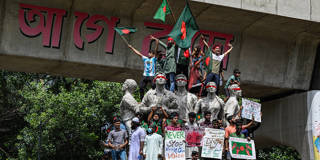While the student uprising in Bangladesh was ostensibly about the government’s job-quota system, the underlying problem was former Prime Minister Sheikh Hasina’s growing authoritarianism. To restore democracy, the interim government must stabilize the economy and rebuild political institutions while remaining non-partisan.
NEW YORK – The downfall of Bangladeshi Prime Minister Sheikh Hasina unfolded faster than almost anyone expected. In early July, students took to the streets to protest the job-quota system that reserved 30% of civil-service positions for veterans of the 1971 War of Independence and their descendants. Police were ordered to quell the unrest, and given permission to shoot if needed. By August 5, nearly 300 people had been killed, and Hasina, under serious pressure from the army, had resigned and fled the country.

NEW YORK – The downfall of Bangladeshi Prime Minister Sheikh Hasina unfolded faster than almost anyone expected. In early July, students took to the streets to protest the job-quota system that reserved 30% of civil-service positions for veterans of the 1971 War of Independence and their descendants. Police were ordered to quell the unrest, and given permission to shoot if needed. By August 5, nearly 300 people had been killed, and Hasina, under serious pressure from the army, had resigned and fled the country.